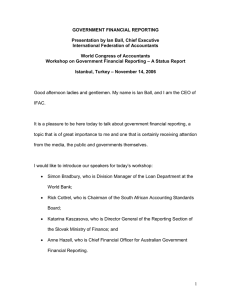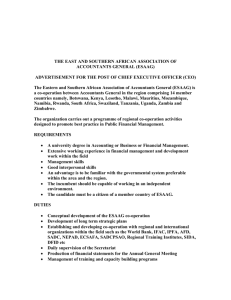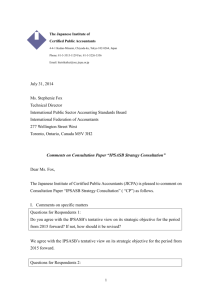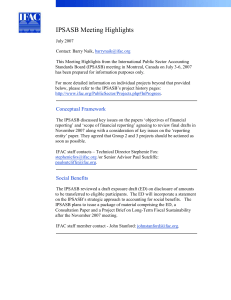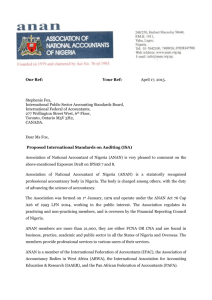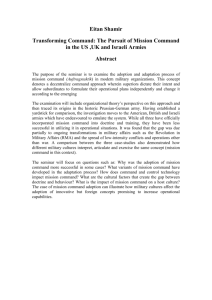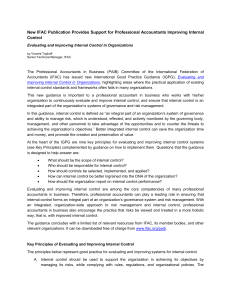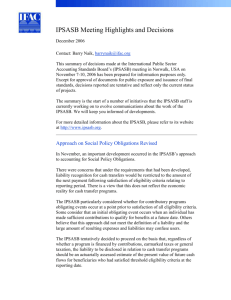unctad oct 6 09 final
advertisement
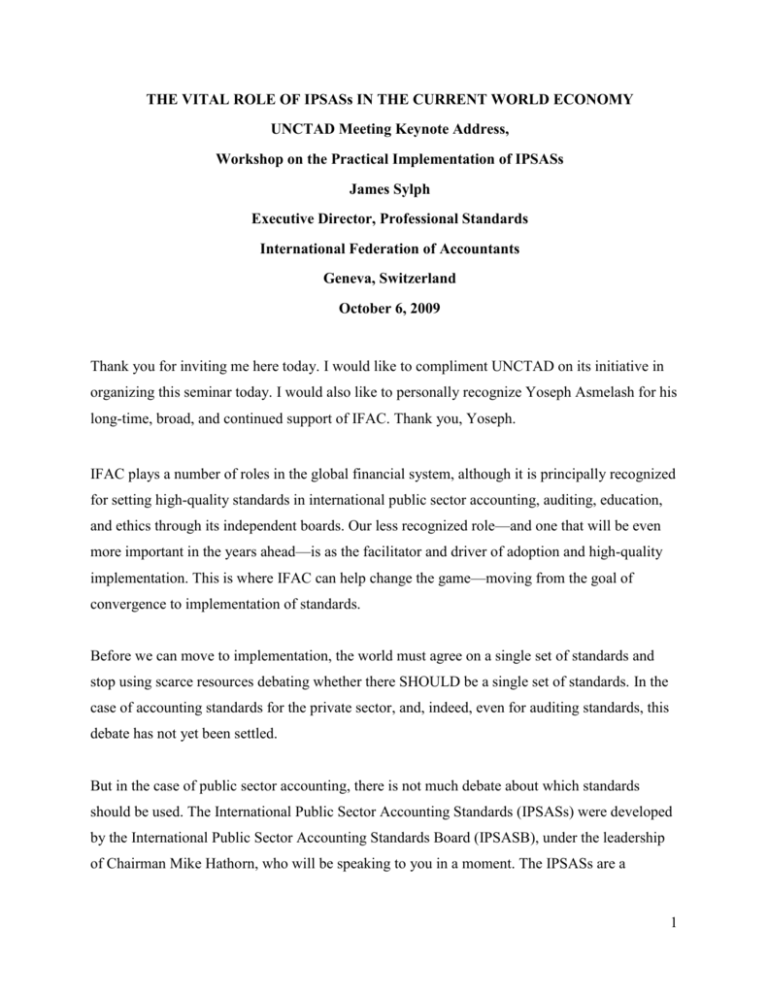
THE VITAL ROLE OF IPSASs IN THE CURRENT WORLD ECONOMY UNCTAD Meeting Keynote Address, Workshop on the Practical Implementation of IPSASs James Sylph Executive Director, Professional Standards International Federation of Accountants Geneva, Switzerland October 6, 2009 Thank you for inviting me here today. I would like to compliment UNCTAD on its initiative in organizing this seminar today. I would also like to personally recognize Yoseph Asmelash for his long-time, broad, and continued support of IFAC. Thank you, Yoseph. IFAC plays a number of roles in the global financial system, although it is principally recognized for setting high-quality standards in international public sector accounting, auditing, education, and ethics through its independent boards. Our less recognized role—and one that will be even more important in the years ahead—is as the facilitator and driver of adoption and high-quality implementation. This is where IFAC can help change the game—moving from the goal of convergence to implementation of standards. Before we can move to implementation, the world must agree on a single set of standards and stop using scarce resources debating whether there SHOULD be a single set of standards. In the case of accounting standards for the private sector, and, indeed, even for auditing standards, this debate has not yet been settled. But in the case of public sector accounting, there is not much debate about which standards should be used. The International Public Sector Accounting Standards (IPSASs) were developed by the International Public Sector Accounting Standards Board (IPSASB), under the leadership of Chairman Mike Hathorn, who will be speaking to you in a moment. The IPSASs are a 1 complete set of high-quality standards that governments at all levels can—and should—be using to report to taxpayers, their elected legislature, and borrowers around the world: Global standards benefit investors, public and private entities of all sizes, and the accountancy profession; Having a high-quality set of standards is meaningless unless they are thoroughly applied; and Implementation of the standards is necessary if we are to achieve high-quality financial reporting and transparency. In times of crisis, such as now, implementation is urgent. IFAC, with 157 members in 123 countries and jurisdictions, has the capability and position to be a game changer in the current environment, moving the world from adoption to implementation. IPSASs and the World Economy Before we get started with our program that will give you details about the practical implementation of the IPSASs, I would like to speak more generally about the vital place that the IPSASs play in the current world economy. The interventions by government over the past 12 months underscore the importance of holding governments to the same high-quality financial reporting standards that we do private entities. Through our years of experience working with public sector accounting we have found that accrual accounting is the best way of managing resources in the public sector and using IPSASs in the preparation of general purpose financial statements is the best way of ensuring transparency since they are international and independent of governments. In a speech this weekend, the chief executive of HSBC painted a sober picture of the economic recovery. He suggested that the economic history will record that we are progressing through a slowdown that looks more like a W than a V and that a further depressing set of indicators will appear before the world climbs out of its recession. Whether we are in the middle of a W or in the aftermath of the financial crisis—we are more convinced than ever of the value of IPSASs and the need for their adoption at an early date. 2 Why Governments Need to be Held to Standards The financial crisis has forced many governments to assume an intervening, if not decisive, role in financial recovery through unprecedented takeovers, lending, guarantees, and bailouts of major market institutions, banks, and companies. These actions are likely to have long-term economic implications and result in new assets liabilities and contingent liabilities being assumed by governments. This, in turn, will demand improved accountability for governmental financial management in order to restore public confidence in government fiscal stability. IFAC hosted a G-20 Accountancy Summit in July 2009 and more than 60 leading members of the accountancy profession from the G-20 countries participated. It was unanimous among those present that the G-20 countries themselves should elevate the quality of their governmental financial reporting. IPSASs Are the Best Way IPSASs are designed to apply to the general-purpose financial statements of all public sector entities. Early on, the IPSASB recognized the need to help developing countries adopt a simpler cash-based approach to governmental reporting. The result was the cash-based IPSAS. But that is only a stepping stone to full and complete disclosure required by accrual based accounting standards. The IPSAS that the board has been working on for the last couple of years are developed for an accruals-based accounting context and enable assessment of the impact of fiscal and monetary policy decisions; assist external reporting by governments to electorates, taxpayers, and investors; and assist in internal management decisions in resource allocation, planning and budgeting, monitoring, and accountability. What the IPSASs do for government agencies and NGOs (UN, INTERPOL, OECD and IFAC): IPSASs were deemed appropriate as they address the international and not-for-profit nature of UN system organizations. Adoption and Implementation 3 The adoption and implementation of IPSASs in each country will require several steps that will likely be universal for all national governments: Adopting IPSASs without alteration at the national level to ensure their consistent, universal application and to enable reliable cross-national financial comparisons; Developing rigorous processes to ensure that IPSASs are translated in a manner which enables consistent application across languages; Identifying and providing support to organizations in order to develop and deliver highquality implementation guidance; and Developing national roadmaps for adoption and implementation of IPSASs that take into account the above factors. We encourage the IMF, World Bank—which have a history of supporting the development of IPSASs—and the IPSASB to continue to promote high-quality financial reporting and to further encourage governments worldwide to adopt these public sector standards. 4 We’re Not Starting from Scratch There is already wide interest in the adoption of IPSASs by governments around the world. Not only does today’s seminar show the depth of interest but a quick reference to the IPSAS section on the Wikipedia website shows a table of over 80 countries that have developed plans for adoption of IPSASs. Switzerland, the country where we sit today, is one of the most advanced proponents of IPSASs. One of the most striking aspects of the Swiss institutional arrangements is their formal adoption of the standards as a restraint on overspending. They chose IPSASs because they are both independently set and provide a clearer and more complete picture of fiscal reality. Next Step IFAC is committed to working with the World Bank and other institutions to deliver assistance efficiently where it can have the greatest impact. While our largest resource allocation is to building and continuously updating high-quality standards, we also spend significant resources on convincing governments and regulators to adopt or converge to those standards and significant, but smaller, resources on assistance for implementation. For IFAC, this crisis offers the opportunity to move beyond the question of whether countries should adopt global standards, and on to the important work of how the standards can be best implemented. The G-20 countries already agree that “a level playing field” (i.e., common standards and rules) is critical to the functioning of the global private-sector financial marketplace. They may not yet realize how important the public-sector market is in the developing world, where governments and their agencies often represent a larger proportion of the GDP than is the case in the developed countries. IFAC has called on the G-20 to support the World Bank’s ROSC initiative as a tool to assess markets and measure the future effectiveness of economic reforms resulting from the economic crisis. 5 IFAC believes that its work with the World Bank must continue to build on our strong support of one another in two critical areas: Establishing the appropriate professional infrastructures in developing and other countries, including encouraging the development of the right legal and regulatory mechanisms; this is a necessary prerequisite for the implementation of standards; and Continuing to urge reforms of public sector financial management systems, encouraging increased government accountability and the adoption of accrual accounting where resources permit. World Bank support of IFAC initiatives has been invaluable. In light of the economic crisis and the IMF mandate, more emphasis will need to be placed on these areas in the future by both IFAC and the World Bank. Other parties should also participate. In closing I would like to compliment, once again, UNCTAD on organizing this timely and relevant seminar. It is, indeed, critical to transparency of governmental actions and financial reporting. But more needs to be done. I hope we can rely on UNCTAD to provide resources to support the ideas proposed in today’s seminar throughout the many countries that so desperately seek financial and technical aid. Thank you. 6
